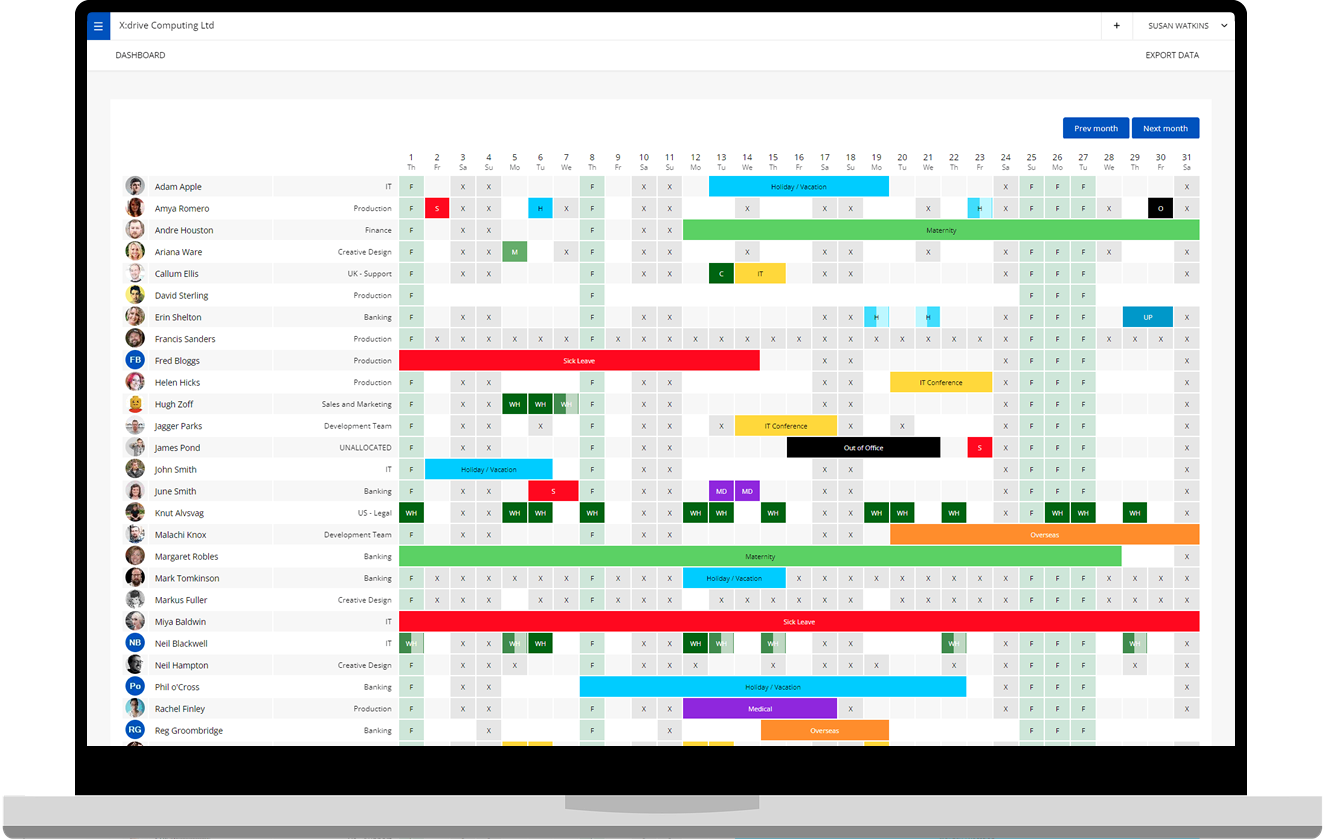
Nobody wants to fall ill. But for many workers, having to take time off through sickness is a real source of fear.
More than 80% of Brits still go to work when they’re sick
, as they either don’t want to let their team down, they’re worried about job security, or they’re just too overwhelmed by their workload to take time off. However, this culture of ‘presenteeism’ has a detrimental impact for employers.
For starters, if that person has something contagious – such as a cold or vomiting bug – they can easily pass it to their colleagues, turning one person’s sickness into an all-company issue. Around 6% of people have even admitted going to work with COVID-19 symptoms
, which could have a truly devastating impact on the workforce.
Even if it’s something that can’t be passed on, nobody works at full capacity when they’re under the weather. And if staff don’t take time off to recuperate, it will take them much longer to return to full health. The stress of coming to work when they’re sick could even trigger longer, more serious illnesses.
As an employer, how can you manage staff sickness better, so people can be absent without guilt – and it doesn’t disrupt company operations? Let’s look at a couple of different scenarios…
How to manage short-term staff sickness
The first issue your business needs to tackle is short periods of absence due to illness, such as a few days off for a sick bug or bout of flu. And the best way to manage this is to put infrastructures in place that make it simple to take time off.
First and foremost, staff need to know where they stand. Your company needs policies in place that outline when employees should take sick leave and, if appropriate, how many paid sick days they’re entitled to each year. You may want to build-in options for when they’re not feeling ill enough to take time off, but going into the office would be less than ideal – for example, advising staff to work from home if they have a cold, to avoid passing it onto colleagues.
Second, your team needs clear processes in place for letting managers and colleagues know that they’re off sick. The last thing you want is a message not getting through to the right person, and team members expecting their colleague to turn up for work when they’re unwell.
Many companies require staff to phone their manager or HR when they are going to be absent due to illness. However, lack of written documentation makes it difficult to communicate staff sickness effectively. Who should be notified that this person isn’t coming in?
One way to manage staff sickness transparently is to record all types of absence centrally via an online holiday calendar
. Using one system for managing all forms of leave provides an accurate picture of who’s going to be in the office day-to-day. This way, if someone isn’t available then their colleagues can check the calendar to see if they’re off sick – or just away from their post or desk.
How to manage long-term staff sickness
As an employer, managing sickness isn’t just a day-to-day issue. Sometimes, valued team members need more time off to rest and recover. They may be battling a chronic health condition that flares up from time to time, such as auto immune disease. They may be suffering from a serious illness, such as cancer.
They may even be struggling with their mental health – something we discussed in our blog post on 7 strategies for supporting employees with mental health conditions.
When someone has major health issues, the last thing they need is the thought that their absence isn’t being managed effectively. It puts pressure on them to return to work before they’re ready, and could result in making their condition worse.
Like short-term illness, logging long-term staff sickness in a staff holiday planner is an effective way to give people appropriate time off, and help team members manage workload while they’re colleague isn’t well enough to come to work.
But whereas short periods of illness are responsive – someone calls in to say they’re unwell and it gets logged on the company holiday calendar – with long-term illness, you can plan ahead.
For example, if a colleague has an operation or period of treatment coming up, you can agree how much time off they’ll need to recover. This can be entered into the holiday calendar in advance, so people know they won’t be available during that period.
In addition to reassuring employees that they’ve got adequate time off arranged, there are many business benefits to pre-emptively managing long-term sick leave. For example:
- People on sick leave won’t be invited to attend events or meetings, because their team members can see they will be off at that time
- Colleagues can arrange their holiday and time off in lieu around the periods when people are off with major health issues, to avoid staffing shortages
- HR have a complete record of all absences
due to illness, so they can keep up communications with employees during their absence and support their return to work
- If your company offers a limited number of paid sick days, you can confidently track when these end and send this information through to your accounts team
Improve the way you manage staff sickness with WhosOff

It may seem unnatural to record illness alongside paid annual leave, but it makes total sense to track every reason that somebody is out of the office in one place.
By creating a complete record of who’s off, everyone in your company knows exactly who is available and can make effective work decisions based on accurate data. Equally, if you can see you’re going to be under-staffed, your business can take avoiding action – such as stopping any further holiday requests from being approved, or hiring temporary staff to bridge the gap.
Online staff management solutions like WhosOff
empower your business to support staff performance at their best, and let people take much-needed sick leave at their worst. So healthy employees aren’t stressed out by their colleagues’ absences, and those affected can fully recover at home before returning to work.
And online software can also help your business to make strategic decisions around staff sickness, allowing certain team members to view who’s off and how many sick days they’ve taken.
Setting the type of leave that each employee can view gives team leaders, senior personnel and HR complete visibility over planned and unplanned absences, while protecting your colleagues from having their sickness record shared with every member of the company. With the right staff management platform, people only see the information they need to see in order to do their job well – and nothing else. Offering staff members with long-term health problems additional peace of mind.
Try WhosOff for free
to see how managing sick leave alongside staff holiday runs tighter knit, more productive business operations.

Start Your Free Trial
Photo by Marcus Aurelius of Pexels.com
WhosOff newsletter
Subscribe now for our hand-picked tips, product updates, latest from the support help desk, and more: straight to your inbox.
Share this article


Posted by Bradley Revell
on Tuesday, 21st September 2021
View all blog articles
Other posts you may like:
What is an annual leave policy?
15.SEP.2021
When you’re launching a business, naturally the focus is on creating plans and growing your customer base. Which means HR tasks like managing annual leave slip to the bottom of the pile.
5 types of time off your business might not track – but needs to
23.AUG.2021
Most businesses have a holiday calendar, but annual leave isn’t the only time that team members are out of the office. There are many reasons why people may be absent from work; and if these aren’t factored into your forward planning, you run the risk of being under-staffed.
How can businesses manage Bank Holiday staffing better?
26.JUL.2021
Bank Holidays are a cause for celebration, but for employers they can be a logistical nightmare. How do you keep operations running when everyone’s off? Or get enough staff to cover jobs when everyone wants to take the day off?